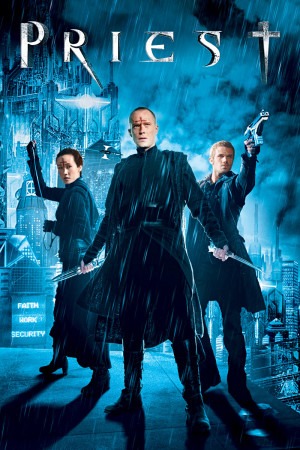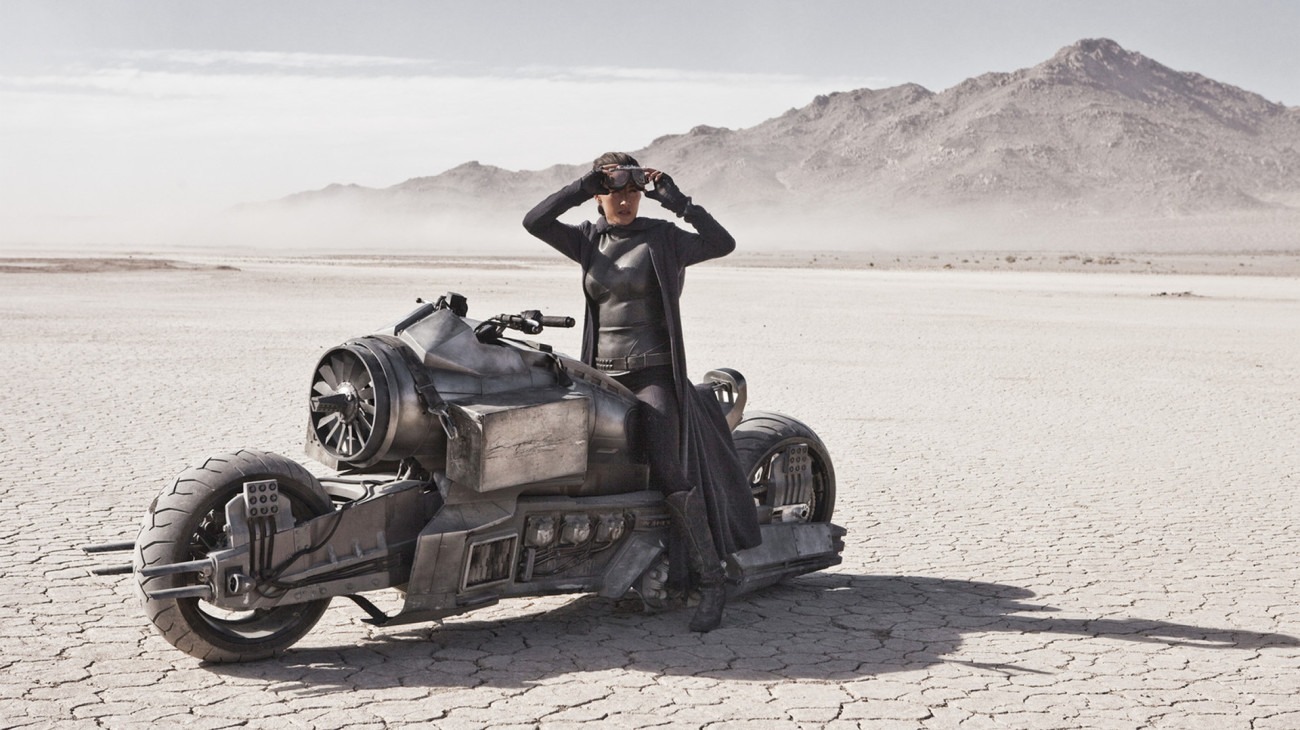
Haven't you got poet, or something like that?
When last we saw director Scott Stewart and actor Paul Bettany collaborating, it was on a religious-themed action/horror hybrid that had virtually nothing to do with anything resembling coherent real-world theology, and it involved undead monsters that were a damn sight cooler than the insipid movie they found themselves inhabiting; it was called Legion. Now repeat that whole exact same paragraph, swap out Legion for Priest, and you've exactly described their new film.
That's a trifle unfair; despite an eyebrow-raising number of exact parallels, Priest is not remotely a retread of Legion. It's a retread of Blade.
No, that's not true either, though it's close enough for government work, as they say. Priest is based on a Korean comic by Hyung Min-Woo, very loosely I am told, and to judge from the comic's Wikipedia page, "loosely" translates as "the title, and also part of it takes place on a train". This film posits a world in which the Catholic Church has been at war with vampires for hundreds of years, and has trained a select caste of warriors, the Priests, who are simply in all ways more capable than normal people, and are the only ones who can possibly beat the fast, vicious monsters in one-on-one combat. This is all communicated to us in a nifty, unmistakably corny opening animation, that briefly threatens to promise a film that's going to be a bit of a gas to watch; a stupid, shallow gas, but it is summer. This feeling continues on into the early sequences set in a walled metropolis called Cathedral City, a damp, dirty cyberpunkish place that suggests a production designer (Richard Bridgland in this case) who was torn between ripping off Brazil or Dark City, and so decided to split the difference (either way, it still ends up being the umpty-leventh film to copy Blade Runner). Original it's not, but sometimes you want to see them reinvent the wheel and sometimes you just want to see a regular old wheel, covered in filthy white neon and video monitors broadcasting Christopher Plummer's face all over.
For Plummer is indeed the Big Brother of Cathedral City, a community that apparently exists solely so that its citizens can regularly prostrate themselves before the Church, which is less a spiritual institution than a totalitarian government with angry slogans plastered all over. Anyway, the film is not about the city nor the Church nor Plummer - all of which facts are disappointing - but about the unnamed Priest played by Bettany, who like his fellow warriors has found it impossible to re-enter polite society after the Church hierarchy officially declared the vampires were no longer a threat, bound as they were to reservations out in the wastelands that apparently cover every inch of the planet not in cities. Unfortunately, some of these vampires have decided not to stay put, and have just attacked a farming outpost; even more unfortunately, the outpost in question was manned by our hero-Priest's brother (Stephen Moyer), his wife (Mädchen Amick), and their daughter Lucy (Lily Collins). Thus the Priest breaks the rules and heads off into the desert with a callow sheriff, Hicks (Cam Gigandet), to stop the monsters and save Lucy, though the Priest threateningly insists that if she's gone vamp, he will kill her, kin or no; this sits poorly with Hicks, who has been shtupping Lucy. There is a subplot involving some other priests sent to apprehend him, but this is a narrative dead end serving only to cram Maggie Q into the film by hook or by crook.
This I was not expecting: that Priest would for most of its running time so breezily steal the entire narrative conceit of The Searchers. Nor, for that matter, that Priest would be content to establish a most peculiar metaphor by which vampires = Native Americans, and whatever point Stewart and first-time screenwriter Cory Goodman were hoping to make with that comparison, I cannot begin to fathom. I think this speaks well of me.
So anyway, Priest is really goddamn weird, and the strange, tortured relationship it all has to the actual Catholic Church and actual priests therein makes sense even less than Legion's fever-dream idea that God is a cosmic bully and angels are his stormtroopers and zombies are involved somehow. There is an absolutely phenomenal batshit-crazy picture to drag out of all that, but it would take a different set of filmmakers, for in addition to being really goddamn weird, Priest is really goddamn serious, something post-apocalypse films in general, and certainly post-apocalypse films with this much what-the-fuckery per square inch, should generally avoid being. Much as with, again, Legion, the tone is largely set by Bettany's alarmingly stern performance: he spits out every single line of dialogue in the same threatening mumble, like he's got a hundred-pound rock on his chest and laryngitis to boot. Also, his expression always suggests a man who smells something incredibly foul and can't place where it's coming from.
So that's our Priest, and the movie is exactly the movie he deserves: it is loud and violent and dark. Like, really dark. "We lit this with the light from our cellphones" dark. I pity anyone who paid the 3-D surcharge on this one: not only did they waste a nice chunk of cash, I also suspect that in at least a couple of scenes, they probably could not make out the action. So, dark, violent, loud: a profoundly gloomy film that goes out of its way to stress how rundown and shitty everything is, not that this is an inappropriate thing to do in a post-apocalypse movie, but Priest isn't edgy and bleak, it's airless and colossally un-fun to watch, though I suppose a sufficiently forgiving (and stoned) viewer could maybe wrest some pleasure from just how over-the-top all the darkness and gloom are; it's a special kind of campy, in its own way.
Along the way, Stewart manages to utterly butcher all of his action sequences, using a particularly unimaginative variety of that "all fast cutting all the time" thing so popular two years ago to render the sequences, at least a couple of which ought to be legitimately exciting given the concept and the choreography, completely illegible; he also abuses slow motion like it's crack cocaine, not only slowing down each and every single action beat that might conceivably be cool, but also activities which no normal person would ever consider, not for even a second, slowing down. Like, for example, the Priest looking at his knife. Zack Snyder himself would consider this egregious.
In all of this utterly dispiriting, ill-written and spastically-directed tripe, there is one bright spot, and that is Karl Urban as the villain, a vampire-infected "familiar" (actually, he's pretty much exactly what you think of when you hear the word "vampire"; but the film's treatment of full-blooded vampires suggests they're a wholly different species, turning humans into slaves with their bites). Urban alone of everyone onscreen appears to think it might be fun to be in a post-apocalypse monster movie, and plays the role accordingly; his character is credited as Black Hat, and that pretty much perfectly describes the sneering Ee-vilness of his performance, all attitude and theatrical wickedness. It's not much, but it's something.
One cannot consider Priest a letdown; there was never any "there" to start with. But enough of the bits around the edges feel like they belong in a better movie that it's hard not to feel disappointed; if nothing else, Cathedral City itself deserves more than the shoddy treatment it gets here. Maybe they can do something in the sequel that is promised by the wildly optimistic ending; not since last year's Robin Hood has a film so baldly admitted that its sole purpose was to set up a sequel that won't get greenlit until Hell freezes over, thaws out, and then freezes over again.
2/10






